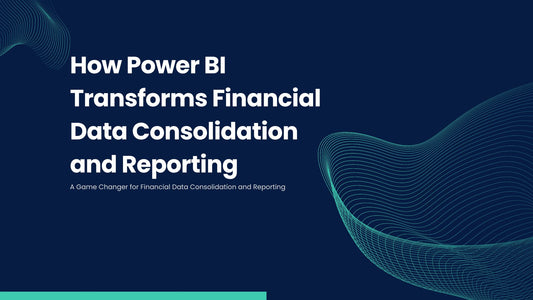In today's fast-paced and increasingly data-driven business environment, the role of an accountant extends far beyond traditional bookkeeping and financial reporting. Modern accountants are expected to be strategic partners who can provide valuable insights and help drive decision-making across various aspects of an organization.
The role of an accountant extends far beyond traditional bookkeeping and financial reporting.
One of the most powerful tools at their disposal is Power BI, a leading business intelligence platform that enables users to visualize, analyze, and share data in ways that were once unimaginable.
Harnessing the power of Power BI, accountants can transform raw financial data into actionable insights, offering a 360-degree view of the organization's financial health and performance. This not only streamlines the process of financial analysis and reporting but also helps identify potential risks, opportunities, and areas of improvement. As a result, businesses can make data-driven decisions that ultimately contribute to achieving their strategic objectives and long-term success.
Transform raw financial data into actionable insights,
In this comprehensive guide summary, we will explore five key use cases of Power BI for accountants, illustrating how this cutting-edge platform can revolutionize the way financial professionals work and add value to their organizations.
From financial reporting and analysis to budgeting, forecasting, expense management, revenue and profitability analysis, and audit and compliance, Power BI empowers accountants to embrace a more strategic and proactive approach to their profession.
For those who may be unfamiliar, Power BI is a suite of business analytics tools developed by Microsoft that enables users to connect to a wide range of data sources, create visually appealing and interactive reports, and share insights with their teams and stakeholders.
Power BI's intuitive interface, rich visualization capabilities, and powerful analytical functions make it an ideal solution for accountants looking to elevate their financial analysis and reporting processes.
The growing importance of data analytics in the accounting profession cannot be overstated. As businesses become more data-driven, accountants need to adapt and evolve to stay relevant and competitive in the marketplace. Power BI offers an unparalleled opportunity for accountants to leverage their financial expertise and analytical skills, transforming complex financial data into actionable insights that drive better decision-making and enhance organizational performance.
As businesses become more data-driven, accountants need to adapt and evolve to stay relevant and competitive in the marketplace.
As you delve into the following sections, you will gain a deeper understanding of the various ways Power BI can be applied in the context of accounting. Each use case is accompanied by a practical example that illustrates how Power BI can be used to address specific accounting challenges and unlock valuable insights.
By embracing Power BI and harnessing its full potential, accountants can significantly elevate their role within an organization, transitioning from traditional financial gatekeepers to strategic partners who drive value creation and contribute to long-term growth.
The world of accounting is rapidly evolving, and professionals who fail to adapt to these changes risk being left behind. Power BI offers accountants a powerful and versatile platform to unlock the hidden potential within their financial data, enabling them to make more informed decisions and contribute to their organization's success in a meaningful way. Whether you are a seasoned accounting professional or just starting in the field, embracing Power BI can be a game-changer, propelling your career and transforming the way you approach financial analysis and reporting.
Power BI offers accountants a powerful and versatile platform to unlock the hidden potential within their financial data
1. Financial Reporting and Analysis:
Power BI can help accountants create interactive financial reports and dashboards that provide real-time insights into the company's financial health. By connecting to various data sources, such as accounting software, ERP systems, or Excel spreadsheets, accountants can visualize key financial metrics like revenue, expenses, profit margins, and cash flow.
Example: An accountant creates a Power BI dashboard that shows the company's profit and loss statement, balance sheet, and cash flow statement, enabling stakeholders to easily monitor financial performance and identify trends or areas of concern.
2. Budgeting and Forecasting:
Accountants can use Power BI to create visualizations and models for budgeting and forecasting purposes. By integrating historical financial data and other relevant variables, accountants can project future financial performance, helping businesses make informed decisions about resource allocation and strategic planning.
Example: An accountant uses Power BI to build a sales forecast model that considers historical sales data, seasonal trends, and promotional activities. This allows the company to predict future sales more accurately and adjust its production and inventory management accordingly.
3. Expense Management:
Power BI enables accountants to analyze and monitor company expenses more effectively. By visualizing expense data from various sources, accountants can identify patterns, anomalies, or areas where cost savings could be achieved. This helps organizations optimize their spending and improve overall financial efficiency.
Example: An accountant creates a Power BI dashboard to analyze the company's travel and entertainment expenses, identifying high-cost areas, and implementing policies to reduce unnecessary spending.
4. Revenue and Profitability Analysis:
Power BI allows accountants to dive deep into revenue and profitability data, segmenting by factors such as product lines, regions, or sales channels. This granular analysis can help identify high-performing products or services, as well as underperforming areas that may require attention.
Example: An accountant uses Power BI to analyze the profitability of different product lines, discovering that one product line has a significantly higher profit margin than others. The company can then decide to focus more resources on promoting and expanding this high-margin product line.
5. Audit and Compliance:
Accountants can leverage Power BI to track and visualize audit and compliance data, making it easier to identify potential issues and ensure that the organization remains in compliance with relevant regulations. Power BI's data analysis capabilities can also help accountants detect anomalies or fraudulent activities more efficiently.
Example: An accountant creates a Power BI dashboard to monitor the company's adherence to internal control procedures and regulatory requirements, such as tax reporting or financial statement preparation. This helps the organization proactively identify and address any compliance issues, reducing the risk of penalties or reputational damage.
The growing importance of data analytics in the accounting profession has necessitated the adoption of innovative tools and technologies that can help accountants stay ahead of the curve.
Power BI, with its comprehensive suite of business intelligence capabilities, has emerged as a game-changer for accountants who seek to leverage the power of data to drive better decision-making and contribute to their organization's success.
By harnessing the full potential of Power BI, accountants can transform raw financial data into actionable insights, empowering them to become strategic partners in their organizations and elevate their professional roles.
Throughout this comprehensive exploration, we have discussed five key use cases of Power BI for accountants, ranging from financial reporting and analysis, budgeting and forecasting, expense management, revenue and profitability analysis, to audit and compliance. Each use case demonstrated the versatility and effectiveness of Power BI in addressing various accounting challenges and unlocking valuable insights that can lead to improved organizational performance. The practical examples provided serve as a testament to the potential of Power BI in revolutionizing the way accountants work and the value they bring to their organizations.
As the accounting profession continues to evolve, it is crucial for accountants to embrace the opportunities presented by modern technologies like Power BI. By doing so, they can not only enhance their analytical capabilities and efficiency but also position themselves as indispensable strategic partners within their organizations. Moreover, the adoption of Power BI can help accountants stay relevant and competitive in a rapidly changing business environment, where the ability to harness the power of data is becoming increasingly essential.
It is crucial for accountants to embrace the opportunities presented by modern technologies
We encourage accountants to explore the myriad possibilities offered by Power BI and consider integrating this powerful platform into their daily workflows. By doing so, they can unlock the hidden potential within their financial data, drive better decision-making, and contribute to their organization's success in a more meaningful way.
As we have demonstrated, Power BI's intuitive interface, rich visualization capabilities, and powerful analytical functions make it an ideal solution for accountants looking to elevate their financial analysis and reporting processes.
The journey to mastering Power BI may seem daunting, but the rewards are well worth the effort. With continued learning, experimentation, and a commitment to staying abreast of the latest developments in the world of business intelligence, accountants can unlock the full potential of Power BI and transform their professional lives. In the end, embracing Power BI and other cutting-edge technologies will not only help accountants thrive in the ever-changing landscape of their profession but also enable them to leave a lasting impact on the organizations they serve.




